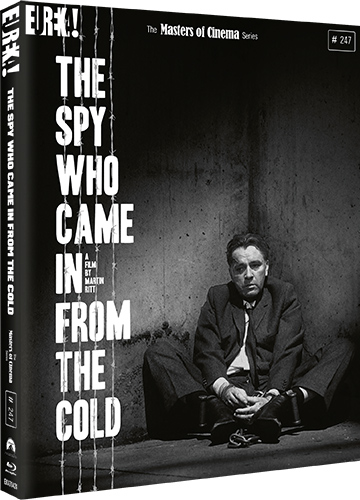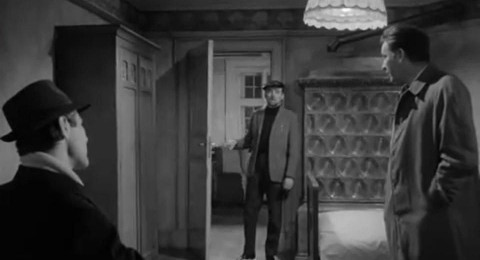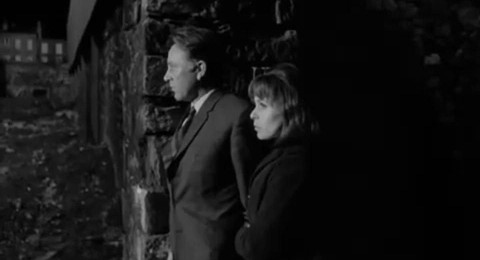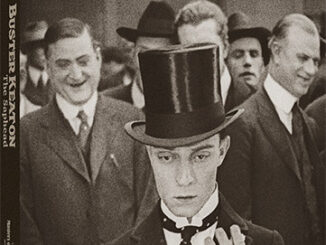The Spy Who Came in from the Cold (1965)
Directed by: Martin Ritt
Written by: Guy Trosper, John le Carré, Paul Dehn
Starring: Claire Bloom, Oskar Werner, Richard Burton, Sam Wanamaker
UK
AVAILABLE ON BLU-RAY: NOW, from EUREKA ENTERTAINMENT
RUNNING TIME: 113 mins
REVIEWED BY: Dr Lenera

After an assignment goes awry, Alex Leamas, an MI6 agent working in East Berlin, is seemingly sent home and out of the service. He tries to live a normal, average life as a librarian’s assistant, but, despite beginning a relationship with communist co-worker Nan Perry, he can’t make it work, partly due to his alcoholism, and ends up in prison after beating up a shop keeper. However, all this was an act to attract the attention of the East German Intelligence Service, which sees him as a potential defector. Leamas seems keen to sell British secrets for money, but what he’s really trying to do is to share information that suggests a high-ranking East German intelligence officer named Mundt is a paid informant of the British….

“It was a foul, foul operation, but it paid off”.
“Who for?”
“What the hell do you think spies are? Moral philosophers measuring everything they do against the word of God or Karl Marx? They’re not! They’re just a bunch of seedy, squalid bastards like me: little men, drunkards, queers, henpecked husbands, civil servants playing cowboys and indians to brighten their rotten little lives. Do you think they sit like monks in a cell, balancing right against wrong? Yesterday I would have killed ? because I thought him evil and an enemy. But not today. Today he is evil and my friend”.
The definitive scene in this incredibly dour, gloomy and cynical spy thriller probably takes place near the end, with the above dialogue exchange. This is about as far away from 007 as can be, a world where things like heroism and decency barely get a look in, a world where the supposed good guys are indistinguishable from the bad guys, a world where the hero is a miserable sod who’s pushed around and used by virtually everybody he meets, a world where dialogue rather than action dominates, because the unglamorous, grubby reality of espionage seems to be mostly consist of lying to bring trouble upon somebody or trying to tell if somebody is lying to you. Even the locations look unappealing, with frequent bad weather and no sunlight, while I don’t think I’ve ever seen the Berlin Wall look more forbidding. This review is a little late in posting, but that’s certainly not because I wasn’t looking forward to seeing this film. On the contrary, I was almost certain that it would be a treat. While I have yet to read one of his novels, I’ve enjoyed films and TV shows based on the work of John le Carre for some time ever since the 2012 version of Tinker Tailor Soldier Spy not just reminded cinemagoers of what spying is really like, but proved that, with top class writing and acting, it can be just as riveting as the more common kind that you see on screen.
Le Carre worked for British Intelligence MI5 and MI6 during the 1950s and 1960s, and often in Berlin, so was able to draw on this real-life experience when he wrote his third novel The Spy Who Came In From The Cold. Published in 1961, it was an instant success. Richard Burton tried to buy the rights immeediately but was beaten by Paramount who initially had Paul Newman in mind as the star. Gary Trosper’s first draft was heavily rewritten by Paul Dehn, who’d worked for British Intelligence during World War 2 and whom le Carre said knew more about the subject than he did. Paramount requested that the name of the principal female character, Liz Gold, is changed to Nan Perry, probably because they were worried about the potential confusion with Burton’s wife, Elizabeth Taylor. Burt Lancaster was to star for a while, with his character’s nationality changed to Canadian to explain his accent, and when Burton got the part le Carre wasn’t too pleased, thinking him too glamorous. Burton was already a heavy drinker and he kept clashing with director Martin Ritt, who hated his boozing and was fed up with Taylor arriving onto the set, drawing large crowds and rowing with Burton, sometimes delaying shooting in the process. Le Carre was asked to come on board, partly to contribute some script alterations, and partly to be a companion to Burton and moderate his drinking. The two actually got on very well. Dublin’s Aardmore Studios and Shepperton Studios saw most of the filming, with some shooting at Noordwiik in the Netherlands and West Berlin. The film came out at the peak of a spy craze with 007 leading the way, but seemed like an anomaly amidst all those cool, glamorous agents, and struggled at the box office.
Things begin and end at the Berlin Wall, a tremendous, lengthy opening shot that lasts the entire opening credits starting off at a barbed wire fence before the camera climbs and pans out to slowly reveal the check points on both sides, a car arriving, and a bar where we meet Alex Leamus waiting for a defector, refusing suggestions that he get some sleep and pouring whisky he carries around with him into his coffee. It’s perhaps tempting to chuckle at the sight of Burton playing a character who puts away the booze, a role which may not have always required much acting, but right from the start he makes a strong impact, with his face puffy, his expression unhappy with much staring, and that melodious voice somehow assuming a gloomy tone. The defector is shot, and, back in London, Control reminds him and us that, “our policies are peaceful but our methods can’t afford to be ruthless than those of the opposition”. In fact throughout Leamus is told that his job requires a willingness to do nasty things, something he doesn’t seem to properly take note of. Control tells him that his next mission will involve a person named Mundt, but first of all he has to play the part of a lonely, bad tempered alcoholic to attract the right attention. He finds work in a library where he meets Nan Perry, who’s very taken with him but clearly has to make the moves. Leamus seems to be most interested in drinking alone in a pub, and gruffly turns down Man’s offer of a sandwich. Then she asks him what he does on pay day, but she’s the one who has to suggest that they spend an evening together. Even when she kisses him, he doesn’t look like it he enjoys it and leaves.

In 1965, it was probably refreshing to have a female librarian be vibrant and sexy, and surprising to see a communist depicted positively even if the screenplay can’t resist making a few digs at the concept. It was probably even more surprising to see Bernard Lee, ‘M’ himself, as a lowly shopkeeper beaten up by Leamus, and if you’re a Hammer fan also look out for a tiny appearance by the one and only Michael Ripper. While in prison, Leamus curiously refuses help from an organisation that’s supposedly all about helping prisoners and ex-prisoners. Once out, he’s approached by Ashe, the head of this organisation, who suggests to Leamus that, if he wants a job, he go to a certain house which turns out to be owned by George Smiley. Yes, le Carre’s oft-portrayed master spy. Here he’s in the form of Rupert Davies, who’s properly unassuming, cold and often lurking around even though he doesn’t say much. At this house, Leamus encounters Control again who fills him in with the details of his mission which first involves him meeting up with an agent named Peters in the Netherlands, though he’s allowed to say goodbye to Nan first. He’s then passed up the chain of the East German intelligence service and continually interrogated in lengthy scenes of chat with a tense edge to them, because this is a film where just a casual look, a phone ringing, or a passing car can point to to something important and probably sinister. There’s also a great little humorous touch of each new interviewer treating his inferior with contempt, something which Leamus even starts to laugh at. When Leamus begins to share this fake information with Mundt’s ambitious second in command Fiedler to get Mundt into trouble for being a double agent, he cleverly makes sure that the evidence is circumstantial, refutes Fiedler’s claim that Mundt is up to no good, and lets Fiedler independently confirm Leamas’ information and comes to the wished-for conclusion on his own.
Of course things go wrong and the plot begins to pile on the surprises that really will surprise, with le Carre’s storytelling at its very best, yet as is often the case it also seems very believable. This is helped, I think, by this film being shot in black and white, which to us folk today often helps to provide a feeling of realism and authenticity to movies made back when news footage tended to be still in monochrome, while Director Martin Ritt [Hud, The Long Hoy Summer] probably paused filming whenever the sun came out, the skies cleared, and things looked nice. Even when we relocate for a bit to the countryside, it’s foggy and forbidding. The prevailing hue is grey, both visually and emotionally, until we get to the shattering climax where darkness surrounds. We have an indication of some of what’s going to happen, partly because of a curiously obvious detail that surely any spy worth his or her salt would pick on up. Or maybe it is picked up on but it’s way past the time for caring. Nonetheless it’s as suspenseful as you can get and benefits from being so quiet without even any scoring, though Sol Kaplan’s music has been used sparsely throughout, and chiefly as connective tissue rather than to enhance drama or excitement even though his several themes seem to get increasingly atonal. The conclusion is perhaps even bleaker than you might expect, yet it’s the perfect one to this truly bitter tale where good people are used, and double and even triple crosses are a common way of life.
Cold is putting it mildly. In terms of life only Nan seems to have much of it in her, helped by Claire Bloom looking ten year younger than her actual age. Everybody else seems to have been so horribly worn down by their job that there really isn’t much humanity there any more. Seamus gains some compassion, falling for Nan even though he doesn’t want to, something shown by Burton with great subtlety – has he ever been better and more perfectly cast? Certain shows of emotion from others indicate that these people are certainly full of character but are now imprisoned in their roles as ruthless schemers. Michael Hordern’s Ashe is the most wretched, pathetic spy you’ll ever see. Peter van Eyck is more frightening as Mundt than any of the Nazis he played despite saying very little. The scenes with Oscar Werner as Fiedler and Burton are incredible and beautifully balanced displays of acting, Werner’s more emotive body language contrasting with Burton’s inertness, while as usual Oswald Morris’s camera tends to stay back and let them do their thing, often in long takes Cyril Cusack’s Control is also brilliant, just notice the way that he seems overly practised in his concern for Control. Of course from today’s point of view is seems absurd that every single person speaks English, but films like this get you thinking this way after you’ve seen them, so that you don’t feel like believing or trusting anybody. And they also remind you that, in any kind of war, there are no real victors, though we’re inclined to think that maybe open warfare is more honest than the treacherous way it’s waged here. The only slightly reassuring suggestion this joyless but meticulously constructed and totally fascinating film offers is that it’s probably better to die for something you believe in rather than live for nothing.
SPECIAL FEATURES
Limited Edition Exclusive O-Card slipcase with new artwork by artist Grégory Sacré (Gokaiju) [2000 copies]
1080p presentation on Blu-ray from a restored high-definition digital transfer
The Spy Who Came In From the Cold has already been out from ESC Editions in France Region B and from Criterion in North America from Criterion Region A, the latter utilising a new HD restoration which is probably the basis for Eureka’s, though Eureka have probably given it a new encode. The dominating greyness probably made this film a rather unappealing one visually on video and maybe even on DVD, but the variety of textures, sharp picture, and huge amount of detail provided by HD make for a really pleasing presentation. A few minor flickers and scratches on the right hand side probably won’t be noticed if you’re not looking for such things.
Uncompressed LPCM Stereo audio
Optional English SDH
Brand new audio commentary with film scholar Adrian Martin
The Criterion had an interview with le Carre, a BBC programme about le Carre, an audio interview with Ritt and a BBC programme about Burton. The ESC had an interview with and analysis of two sequences by film expert Frédéric Albert Levy, but for material concerning the actual film ehst Eureka offers is considerably better. As usual I was looking forward to Martin’s commentary and he didn’t disappoint, though of course he has so much talk about it yet as usual with Martin the deluge of information and insights never wears or becomes dry. We have a lot of comparing with the novel and learn that it had an action scene that wasn’t used in the film where Seamus fights with a German guard, but also that generally it did a fine job of adapting and compressing, and even made a few improvements. There’s also much detail about the production process and appreciation of Ritt’s direction and his rich and subtle exploring of social behaviour. Martin doesn’t stop praising the film, but then why should he? It’s superb.
Cold Light: A brand new video essay by critic and filmmaker David Cairns [22 mins]
And secondly we have a contribution from another one of my favourite contributors to these things, going pretty deep and covering a hell of a lot despite not being particularly long. Here, the piece also includes some ‘then and now’ location comparisions which is something I also love, and brief excerpts from interviews with le Carre, Burton, Ritt and others, all voiced by others but all pretty convincing [though I have no idea what Ritt sounded like]. Cairns tells us more about Ritt including how at the start of his career he could only direct a stage play if he named names [this was during the McCarthy era], more detail about what went on to during production including a row between Burton and Taylor being heard over an intercom, and that le Carre accurately said that Burton confused being a great actor with being a star. We do have analysis of the film too, and, like the commentary, this will only increase your admiration of.
A collector’s booklet featuring a new essay by Richard Combs
Graham Greene called the novel “the best spy story ever written”. The film may just be the best spy movie ever made. Very Highly Recommended.







Be the first to comment